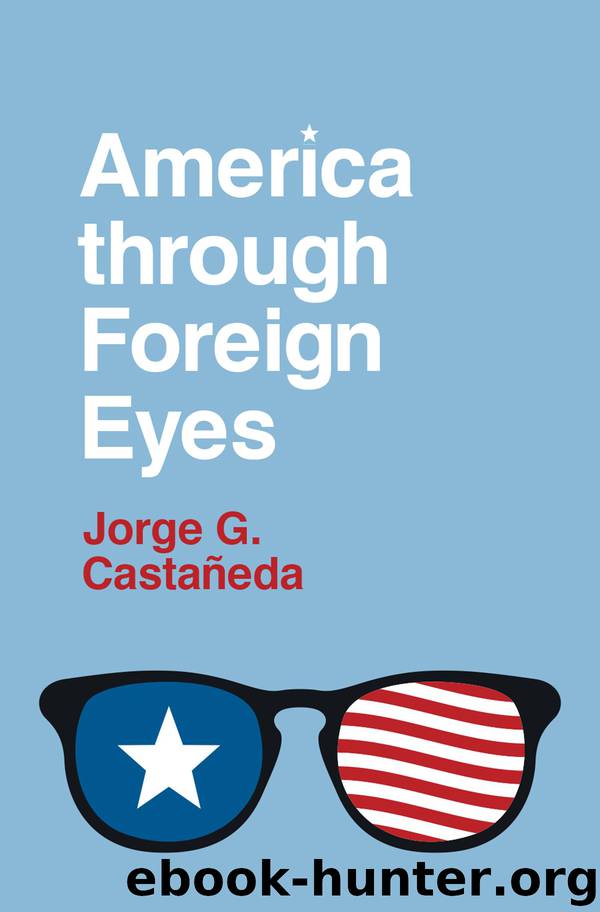America through Foreign Eyes by Jorge G. Castañeda

Author:Jorge G. Castañeda
Language: eng
Format: epub
Publisher: Oxford University Press
Published: 2020-06-15T00:00:00+00:00
What Americans want
There are myriad examples of the contradictory nature of different Americans’ wishes regarding immigration. A typical one involves meat-packing plants in Iowa. Thousands of Mexicans and Laotians (for historical reasons) work in the plants, doing chores that are dangerous, unpleasant, and poorly paid by US standards. The traditional communities in the region were unaccustomed to foreigners living in their midst, especially brown-skinned, Spanish-speaking, Catholic, and soccer-playing foreigners they had truly never come across in their lives. With time, many of the racist sentiments faded, and the people in towns like Storm Lake actually get along quite well. Somewhere, somehow, the traditional white, Anglo-Saxon inhabitants understood or sensed that either Mexicans would toil at the meat-packing plants in Iowa or they would work at the same plants in Mexico, but that it was one or the other. Americans were not going to fill those jobs, but if the plants moved south, an entire community would be destroyed. Whereas if they remained in Iowa with unauthorized Mexicans at work, the benefits to the community would also remain.
Couldn’t the Mexicans be regularized, or legalized, or amnestied? They have been toiling in Iowa for nearly fifteen years. In theory, they could be, but amnesty has not made it through Congress since 1986. Granting amnesty and a path to citizenship seems the logical solution, but it also means that the meatpacker employees could eventually bring nuclear family members from Mexico, register to vote, and probably elect Democrats to Congress and the White House. Republicans do not like either of these two consequences of amnesty; that is why they steadfastly reject it, ever since Reagan. So the real, pragmatic solution, not the ideal solution, is the legal and moral limbo the Mexicans of Storm Lake live in, with the ensuing hypocrisy about a nation of laws.
Incidentally, the congressional district encompassing Storm Lake, the Mexicans and Laotians, and the meat-packing plants is represented in Washington by Steve King, generally considered the most racist, strident, hateful bigot in the House of Representatives. He has been convicted of hate-speech, denounced by his peers, but re-elected by his voters. They coexist with the hypocrisy of the pestilent, dangerous plants: living side by side with Mexicans and sending someone to Congress who hates them. A similar experience can be found with Guatemalan immigrants, also in the meat-packing plants of Morgantown, North Carolina.
Allentown, the third-largest city in Pennsylvania, provides another good example. The old, Rust-Belt town, visited by James and Deborah Fallows in their beautiful “Our Towns,” had practically no Latinos among its residents in 1980; they were not even counted. By the year 2000, one of every four inhabitants was Hispanic. In 2010, the percentage reached 42 percent, and in 2017, more than half the population was Latino.10 In other words, in the space of forty years, the growth was exponential, as was the novelty, the initial fear, and the subsequent accommodation. This in a city close to Hazleton, Pennsylvania, where one of the great anti-immigrant scares of the early 2000s took place.
Download
This site does not store any files on its server. We only index and link to content provided by other sites. Please contact the content providers to delete copyright contents if any and email us, we'll remove relevant links or contents immediately.
| Arms Control | Diplomacy |
| Security | Trades & Tariffs |
| Treaties | African |
| Asian | Australian & Oceanian |
| Canadian | Caribbean & Latin American |
| European | Middle Eastern |
| Russian & Former Soviet Union |
The Secret History by Donna Tartt(16607)
The Social Justice Warrior Handbook by Lisa De Pasquale(11485)
Thirteen Reasons Why by Jay Asher(7780)
This Is How You Lose Her by Junot Diaz(5753)
Weapons of Math Destruction by Cathy O'Neil(5029)
Zero to One by Peter Thiel(4816)
The Myth of the Strong Leader by Archie Brown(4785)
Promise Me, Dad by Joe Biden(4440)
Stone's Rules by Roger Stone(4412)
Beartown by Fredrik Backman(4403)
How Democracies Die by Steven Levitsky & Daniel Ziblatt(4392)
The Fire Next Time by James Baldwin(4336)
100 Deadly Skills by Clint Emerson(4070)
A Higher Loyalty: Truth, Lies, and Leadership by James Comey(4024)
Rise and Kill First by Ronen Bergman(4008)
The David Icke Guide to the Global Conspiracy (and how to end it) by David Icke(3875)
The Farm by Tom Rob Smith(3869)
Secrecy World by Jake Bernstein(3773)
The Doomsday Machine by Daniel Ellsberg(3725)
